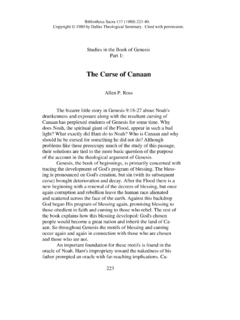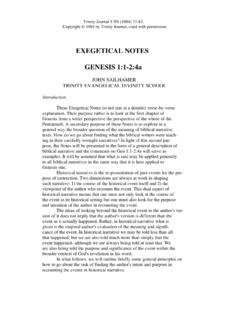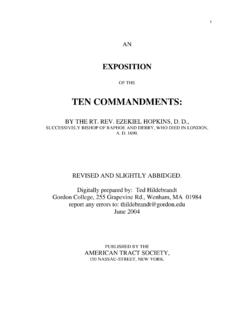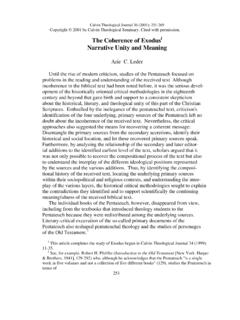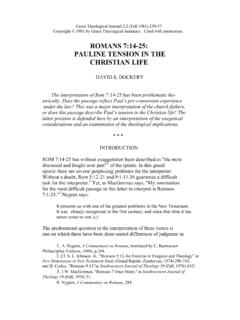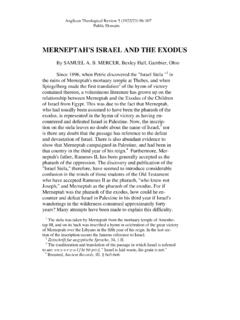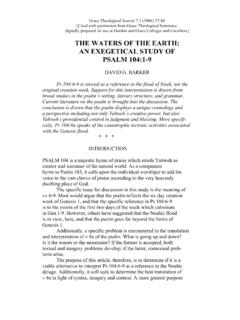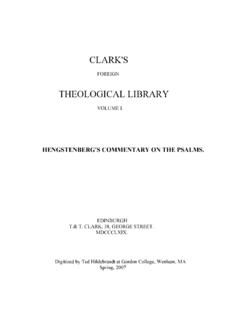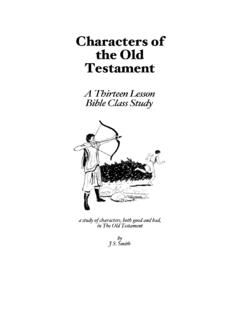Transcription of The Theology of Sexuality in the Beginning: Genesis 3
1 Andrews University Seminary studies , Summer 1988, Vol. 26, No. 2, 121-131. Copyright 1988 by Andrews University Press. Cited with permission. THE Theology OF Sexuality IN THE BEGINNING: Genesis 3 RICHARD M. DAVIDSON Andrews University The creation accounts (Gen 1-2) coupled with the portrayal of disruption and divine judgment presented in Gen 3 have been described as of seminal character and determinative for a biblical Theology of human Sexuality . In a previous article we focused upon the Theology of Sexuality in the creation Now we will explore the theological insights on Sexuality emerging from Gen 3.
2 Two basic issues related to Sexuality call for our attention in Gen 3. The first concerns the contention by some scholars that Adam and Eve's "knowledge of good and evil" and their knowledge "that they were naked" (3:5, 7) both refer to the awakening of their sexual consciousness. The second issue involves the debate over the correct interpretation of the divine judgment on Eve (3:16). 1. Sexuality in Genesis 3:5 We cannot be long detained by those who contend that the knowledge of good and evil gained by Adam and Eve as a result of eating the forbidden fruit was actually a consciousness of Sapp rightly points out that "such a position assumes that Sexuality itself occasions shame by its very nature (once one is aware of it)
3 " and thus "suggests that Sexuality was not part of God's intention for humans in creation," whereas both Gen 1 and 2, to the contrary, "consider Sexuality to be a purposeful part of God's good creation, with no indication whatsoever that sexual experience was jealously withheld from Adam and Eve."3 1 Richard M. Davidson, "The Theology of Sexuality in the Beginning: Genesis 1-2," AUSS 26 (1988):5-24. 2 See, , Cuthbert A. Simpson, "The Book of Genesis : Introduction and Exegesis," IB (New York, 1952), 1:485-486. For a full discussion, cf. Robert Gordis, "The Knowledge of Good and Evil in the Old Testament and Qumran Scrolls," JBL 76 (1957):123-138.
4 3 Stephen Sapp, Sexuality , the Bible, and Science (Philadelphia, 1977), p. 18; cf. pp. 17-19 for further arguments advanced by Sapp against this option. 121 122 RICHARD M. DAVIDSON The Nakedness of Adam and Eve The idea that a consciousness of sex came only after the Fall seems to be largely based on a misunderstanding of the meaning of Gen 3:7 and its relationship to Gen 2:25. It has been argued that since, according to Gen 3:7, Adam and Eve knew that they were naked only after the Fall, then Gen 2:25 must mean that they were not aware of their nakedness (or Sexuality ) in the beginning.
5 But this line of argument fails to recognize that Gen 2 and 3 utilize two different Hebrew words for "naked." In Gen 2:25 the word for "naked" is arum, which elsewhere in Scripture frequently refers to someone not fully clothed or not clothed in the normal Gen 2:25 does not explicitly indi- cate in what way Adam and Eve were without clothes in the normal sense ("normal" from the post-Fall perspective), but the semantic range of arum is consonant with the conclusion toward which parallel creation/Paradise passages point, namely, that Adam and Eve were originally "clothed" with "garments" of light and If such is the case in Gen 2:25, then the contrast with Gen 3 becomes clear.
6 In Gen 3:7, 10, 11, the Hebrew word for "naked" is erom, which elsewhere in Scripture always appears in a context of total (and usually shameful) exposure, describing someone "utterly 4 In 1 Sam 19:24, for instance, the term is "used of one who, having taken off his mantle, goes only clad in his tunic" (William Gesenius, Hebrew and Chaldee Lexicon to the Old Testament Scriptures [Grand Rapids, MI, 1949], p. 653). Again, in Isa 20:2 the reference is to one "dressed with saq only" (Ludwig Koehler and Walter Baumgartner, Lexicon in Veteris Testamenti Libros, 2d ed. [Leiden, 1958], p. 735); cf. Jn 21:7.
7 Other passages employ the term in the sense of "ragged, badly clad" (Job 22:6; 24:7, 10; Isa 58:7; Gesenius, p. 653). 5 We note in particular the parallel creation account in Ps 104. Jacques Doukhan, The Genesis Creation Story: Its Literary Structure, Andrews University Seminary Doctoral Dissertation Series, Vol. 5 (Berrien Springs, MI, 1978), pp. 81-88, has analyzed the point-by-point parallels between Ps 104 and the Genesis creation story. What is significant for our discussion at this point is that in Ps 104, along with the poetic description of God's creative work, there appears to be at least one indication of his appearance, or rather, his "clothing" (vss.)
8 1-2): "Thou art clothed with honor and majesty, who coverest thyself with light as with a garment." If God is portrayed as clothed with "garments" of light and majesty, it is not unreasonable to deduce that man, created in the image and likeness of God, is similarly clothed. Ps 8:5 (6 Heb) may also point in this direction. According to this verse describing man in Paradise, God "crowns" or "surrounds" (the latter if `afar is taken as Qal) him with glory and honor. Theology OF Sexuality 123 naked" or "bare. 6 As a result of sin, the human pair find them- selves "utterly naked," bereft of the garments of light and glory, and they seek to clothe themselves with fig leaves.
9 Even this post-Fall "nakedness" should not, however, be inter- preted as causing Adam and Eve to be ashamed of their own bodies before each other. There is no mention of mutual embarrassment or shame before each other. The context is rather one of fear and dread before God. Adam says to God (3:10), "I heard the sound of thee in the garden, and I was afraid, because I was naked, and I hid myself." Adam's nakedness described here is also obviously more than physical nudity, for Adam depicts himself as still naked even though already covered with fig leaves. The nakedness of Gen 3 seems also to include a sense of "being unmasked,"7 a conscious- ness of guilt, a nakedness of soul.
10 Likewise, God's clothing of Adam and Eve with skins appears to represent more than a concern for physical covering, more than a demonstration of the modesty appropriate in a sinful world, though these are no doubt included. The skins from slain animals seem to intimate the beginning of the sacrificial system and the awareness of a substitutionary atone- ment, because of which "man need no longer feel unmasked or ashamed."8 2. The Divine judgment on Eve When God comes to the Garden after Adam and Eve sinned, he initiates an encounter that constitutes nothing less than "a legal process," a "trial and punishment by God.
